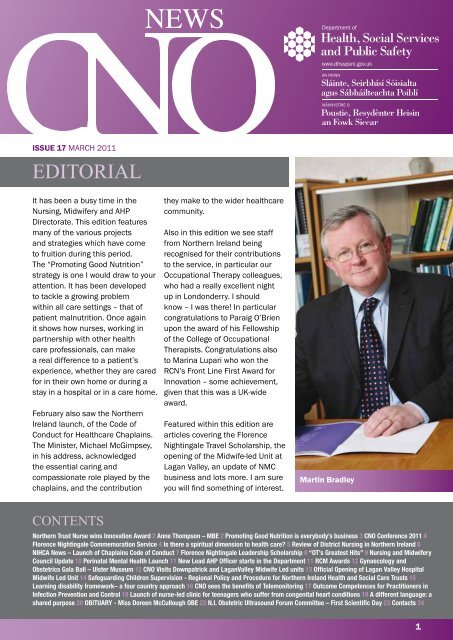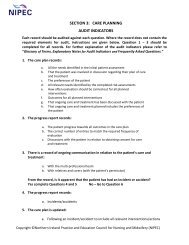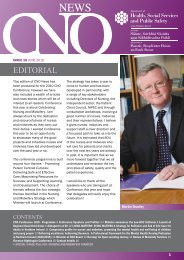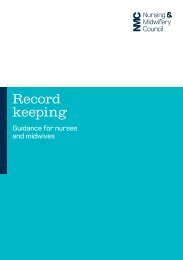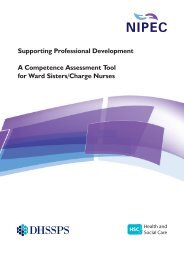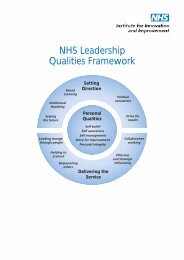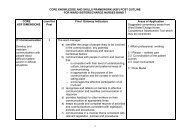CNO Newsletter March 2011 - Department of Health, Social ...
CNO Newsletter March 2011 - Department of Health, Social ...
CNO Newsletter March 2011 - Department of Health, Social ...
Create successful ePaper yourself
Turn your PDF publications into a flip-book with our unique Google optimized e-Paper software.
“OT’s Greatest Hits”The OT’s Greatest Hits eveningorganized by the Northern IrelandBoard <strong>of</strong> the British Associationand College <strong>of</strong> OccupationalTherapists was to acknowledgeoccupational therapists whohave retired recently, and tocelebrate those who have receivedrecognition during the past year fortheir contribution to occupationaltherapy in Northern Ireland.Martin Bradley, Chief NursingOfficer made the presentations.Paraig O Brien was recognizedfor his Fellowship <strong>of</strong> the College<strong>of</strong> Occupational Therapists. Theaward <strong>of</strong> Fellowship is the highesthonour the College can bestow onone <strong>of</strong> the pr<strong>of</strong>essional members inrecognition <strong>of</strong> exceptional serviceand outstanding contribution tothe pr<strong>of</strong>ession. Paraig trained asan occupational therapist at theUlster University and has workedacross a wide range <strong>of</strong> areas buthis vision has always been tocreate the best possible servicesfor disabled people. His passion forthe occupational therapy pr<strong>of</strong>essionand the work that he does is alwaysevident. He has contributed tothe pr<strong>of</strong>ession by his involvementin research, policy, educationand practice. Paraig now worksas Housing Adaptations LiaisonOfficer, Northern Ireland HousingExecutive/DHSSPS and is presentlyinvolved in a Review <strong>of</strong> HousingAdaptations in Northern Ireland.Rhoda Baxter, OccupationalTherapist and Pavestone CentreManager, was awarded an MBEL to R: Martin Bradley <strong>CNO</strong>, Paraig O’Brien, Rhoda Baxter, John McAuley andJames Leckeyin the Queen’s Birthday Honourslist this year for her services topeople with disabilities in NorthernIreland. This is a well deservedaward in recognition <strong>of</strong> Rhoda’swork over the years. Rhoda has hada wide range <strong>of</strong> experience witha particular interest in vocationalrehabilitation. She has alsoworked as an occupational therapylecturer at the University <strong>of</strong> Ulster.In 2003 Rhoda was appointed asManager <strong>of</strong> the Pavestone Centrein Coleraine, (PAVE stands forPreparation and Assessment forVocation and Enjoyment).John Mc Auley is an occupationaltherapy technical instructor in RoyalHospitals, Belfast <strong>Health</strong> and <strong>Social</strong>Care Trust in Care <strong>of</strong> the Elderly.John was recognized as this year hewas the HSC Innovations ElevationAward Winner for ‘EquipmentDesign <strong>of</strong> the Year’. John’sinnovation was a ‘Portable kneeblocker for use in occupationaltherapy’.James Leckey was acknowledgedas a recipient <strong>of</strong> an Honorary Fellow<strong>of</strong> the College <strong>of</strong> OccupationalTherapists this year. James is ChiefExecutive <strong>of</strong> James Leckey DesignLtd, based in Northern Ireland –which designs and manufacturespositioning equipment for childrenwith cerebral palsy, musculardystrophy, spina bifida and otherspecial needs. James has beenworking in partnership with DrAlison Porter-Armstrong, SeniorLecturer in Rehabilitation Sciencesand Jackie Casey, Lecturer inOccupational Therapy who bothwork at the University <strong>of</strong> Ulster.9
NEWSNursing and MidwiferyCouncil UpdateAdvice and information for employers <strong>of</strong>nurses and midwives.The Nursing and Midwifery Council (NMC)has produced a booklet that sets out the keyresponsibilities for employers <strong>of</strong> the UK’s 660,000registered nurses and midwives. The bookletintroduces employers, not all <strong>of</strong> whom will be a nurseor midwife, to the NMC, and informs employers abouttheir responsibilities for making sure their nursesand midwives continue to meet the registrationrequirements and are fit to practise.NMC Chief Executive and Registrar, Pr<strong>of</strong>essorDickon Weir-Hughes said: “Not everyone involved inthe employment <strong>of</strong> nurses and midwives will be anurse or midwife themselves so we need to makesure everyone understands our role and the jointresponsibility we share in ensuring the health andwellbeing <strong>of</strong> the public.The way in which healthcare is delivered is changing,particularly as more care is moved into the community.Employers are responsible for the conduct andperformance <strong>of</strong> their staff and will need to developnew and innovative ways to ensure their nursesand midwives receive regular appraisals and thateducation and training opportunities are madeavailable”.Fitness to Practice ReferralsThe guide also informs employers about the processfor referring someone to the NMC for investigation.“Our role is not to punish nurses and midwives. Ourrole is to safeguard the health and wellbeing <strong>of</strong> thepublic from nurses and midwives whose fitness topractise is impaired and whose situation cannot bemanaged locally. This new guide will help employersto identify when they should be referring someoneto us for investigation and when they should bemanaging these issues through their own disciplinaryprocedures.”Raising and escalating concerns.Guidance for nurses and midwivesEvery registered nurse and midwife in the UK hasbeen sent information about how to raise and escalateconcerns about the safety or wellbeing <strong>of</strong> people intheir care.The NMC has produced guidance underpinned by theprinciples set out in the Code: Standards <strong>of</strong> conduct,performance and ethics for nurses and midwivesand Guidance on pr<strong>of</strong>essional conduct for nursingand midwifery students. The raising and escalatingconcerns booklet is for all nurses, midwives and preregistrationnursing and midwifery students. It willestablish principles for best practice in the raising andescalating <strong>of</strong> concerns and aims to complement localwhistle blowing policies and safeguarding procedures.NMC has developed a specific section on their websiteto provide further information. This can be accessedfrom www.nmc-uk.org and explains the processesthat should be followed and provides informationabout the legislation in this area and indicates whereconfidential support and advice can be accessed.Commenting on the new guidance, NMC ChiefExecutive and Registrar, Pr<strong>of</strong>essor Dickon Weir-Hughes said: “Poor care must never be tolerated. Thisnew guidance will support nurses and midwives toeffectively manage risk and empower them to speakout on behalf <strong>of</strong> the people and families in theircare. However raising a concern is only the first step.This guidance will only be effective if managers andsenior staff are committed to a culture that openlyencourages people to raise concerns. I encouragenursing and midwifery leaders to be proactive in theirapproach to disseminating the guidance to their staffand urge them to nominate a champion to lead onimplementing the guidance across their organisation.”(For further information on regulation <strong>of</strong> thepr<strong>of</strong>essions see back page for details)10
Perinatal Mental <strong>Health</strong> LaunchOn the 9th December MichaelMcGimpsey, Minister for <strong>Health</strong><strong>Social</strong> Services and Public Safetylaunched a training programme fordetection <strong>of</strong> women with mentalhealth problems during pregnancy.This regional programme is initiallytargeted at midwives but will berolled out to other pr<strong>of</strong>essionsincluding health visitors andmedical staff. The programmewas developed by the RegionalPerinatal Mental <strong>Health</strong> Forum,a multi-disciplinary group <strong>of</strong>pr<strong>of</strong>essionals established topromote evidence-based practicein perinatal mental health throughstrategic discussions, workshops,training and conferences inconjunction with the BeechesManagement Centre. Set up byDr Janine Lynch a ConsultantPsychiatrist from the BelfastTrust and Shona Hamilton aMidwife Teacher at the BeechesManagement Centre they workedtogether to develop a one daytraining programme for midwivesin response to changes in thequestions midwives ask women attheir booking visit regarding theirmental health.Launching the programme theMinister said, “The quality <strong>of</strong>care that women receive duringpregnancy, at birth and in the earlyweeks after birth influences boththe health <strong>of</strong> the mother and <strong>of</strong>their babies. Midwives have animportant part to play in this, andneed to be sensitive to and aware<strong>of</strong> the mental health needs <strong>of</strong> themother.”Dr Margaret Oates OBE, a leadingexpert in the area <strong>of</strong> perinatalmental health and Dr Michael McBride, Chief Medical Officer alsospoke at the launch.L to R: Dr Janine Lynch, Michael McGimpsey (<strong>Health</strong> Minister) Dr MargaretOates and Shona Hamilton.NEW LEAD AHP OFFICER STARTS IN THE DEPARTMENTPauline Mulholland has been recently appointed towork in the <strong>Department</strong> as Lead AHP Officer. Paulinetakes responsibility for pr<strong>of</strong>essional issues affecting theAllied <strong>Health</strong> Pr<strong>of</strong>essions across the HSC.Pauline took up her secondment on 17 January and willbe in post for a 12-month period. Previously Paulinewas the Lead Dietitian for the South Eastern Trustbased at the Ulster Hospital.Pauline’s immediate priority is to oversee thedevelopment and publication <strong>of</strong> an AHP Strategy forNorthern Ireland. Pauline has said she is lookingforward to the challenges over the year ahead.Commenting on her appointment,Martin Bradley (<strong>CNO</strong>) said“Pauline comes to the<strong>Department</strong> with a strong trackrecord <strong>of</strong> achievement andbrings a wealth <strong>of</strong> knowledgeto this post. She is held in highregard by her pr<strong>of</strong>essionalcolleagues both here inNorthern Ireland and acrossthe UK. I am looking forwardto working with Paulineand developing closer tiesbetween the AHP and nursing workforce.”Pauline can be contacted by phone (9052 0722) or by email (pauline.mulholland@dhsspsni.gov.uk)11
NEWSRCM AwardsThe Royal College <strong>of</strong> Midwives annual awardceremony took place in London on the 19th January<strong>2011</strong> and as always Northern Ireland Midwives cameaway successful. The awards were presented bytelevision presenter Natasha Kaplinskey who statedthat this celebration <strong>of</strong> midwifery made her want tohave another baby.Jasmine Callow a midwife at the Mater Maternity Unitwon the Johnson’s Baby Mums’ Midwife <strong>of</strong> the YearAward for Northern Ireland and was commended bythe judges in the final for the overall midwife <strong>of</strong> theyear. The mum who nominated Jasmine said <strong>of</strong> her“Jasmine made me feel like I really mattered andprovided tremendous emotional support to me”.Also winning were two student midwives fromQueens University who won the Pampers StudentVision Award- Dawn Nelson and Lisa Darragh. Thisyear Dawn and Lisa are undertaking a four weekelective placement to Chitokoloki Hospital in ruralZambia. They were described as self motivated andenthusiastic students with a strong desire to broadentheir experiences and develop their knowledge <strong>of</strong>midwifery practice.Dame Karlene Davis was given the lifetimeachievement award for her outstanding contributionto the pr<strong>of</strong>ession. Dame Karlene was previouslyGeneral Secretary <strong>of</strong> the College.Above: L to R:Cathy Warwick,General SecretaryRCM SponsorRepresentative,Lisa Darragh,Dawn Nelson,NatashaKaplinskeyRight: JasmineCallow withNatashaKaplinskeyGynaecologyand ObstetricsGala Ball –Ulster MuseumL to R: Joan Neill, Sharon Watt, Joan Hunter, Jillian Downeyand Emma McNeillOn 13th January <strong>2011</strong> <strong>CNO</strong> attended a gala ball inthe Ulster museum organized by obstetricians andmidwives in Lagan Valley Maternity unit. The aim<strong>of</strong> the ball was to celebrate the obstetric led unit in12
<strong>CNO</strong> Visits Downpatrick andLaganValley Midwife Led unitsOn 23rd February Martin Bradleyvisited the 2 freestanding midwifeled units in Northern Ireland. Thefirst visit was to the Downe Hospitalwhere the midwife led unit had justcelebrated its 50th birth. When itopened on the 22nd <strong>March</strong> 2010the target was that 50 babieswould be born in the first year. On15th February baby Faye arrived tocomplete this target a month ahead<strong>of</strong> schedule. Faye’s mum Louisehas appealed in the Down Recorderfor women across the district to usewhat she has described as “thiswonderful facility”. On visiting theunit the <strong>CNO</strong> met with the Head <strong>of</strong>Midwifery, Elaine Madden, and theAssistant Director for women andchild health, Eileen Mc Eneaneyand many <strong>of</strong> the midwives.The midwives in Downpatrick havebeen providing antenatal andpostnatal services to local womensince the closure <strong>of</strong> the obstetricunit in 2002 and are very excitedto now be able to provide a midwifeled service for women duringlabour and delivery.Mrs Mc Eneaney said shewas delighted by the 50thbirth which was achievedthanks to the dedicated andvery experienced midwivesin Downpatrick as well assupport from the localcommunity.Following the visit to the Downethe <strong>CNO</strong> visited the newmidwife led unit in Lagan Valleywhich transferred servicesfrom obstetric led on the 2ndFebruary. The unit has beengiven a complete refurbishmentto bring it up to the standard<strong>of</strong> both Downpatrick and theHome from Home in the Ulster.The Minister for <strong>Health</strong> <strong>Social</strong>Services and Public Safety will<strong>of</strong>ficially open the unit on the 10th<strong>March</strong>. On the day <strong>of</strong> the visit therehad been 12 babies born to date.L to R:Donna Smyth (Student Midwife),Martin Bradley (Chief Nursing Officer)and Zoe Boreland (Lead Midwife)L to R:Aine McGinn, Elaine Madden, TeresaMcDowell, Helen Wallace, PaulaMcConn and Martin BradleyLagan Valley and its contribution to maternityservices over the years as well as celebrate thefact that once these services were withdrawn afreestanding midwife led unit would remain.The obstetricians in Lagan Valley since theannouncement <strong>of</strong> the development <strong>of</strong> amidwife led unit have been very supportive<strong>of</strong> the concept both encouraging the womenfrom the area and the general practitioners tocontinue to book in the unit when appropriate.Obstetricians and midwives past and presenthad a great evening saying goodbye to one eraand welcoming another.L to R: Dr Caroline Bryson, Hugh McCaughey (Chief Executive),Seamus McGoran (Director <strong>of</strong> Hospital Services) and ZoeBoreland (Lead Midwife)13
NEWSOfficial Opening<strong>of</strong> Lagan ValleyHospital MidwifeLed Unit.<strong>Health</strong> Minister Michael McGimpsey meets Kerry andAllan Houston and their new baby Adam. Looking on areLynne Logan (Team Midwife), Hugh McCaughey (ChiefExecutive) and Sarah Rankin (Team Leader).<strong>Health</strong> Minister Michael McGimpsey <strong>of</strong>ficially opens theMidwife Led Unit at Lagan Valley Hospital. Also picturedare Ashley Johnston (Staff Midwife), Zoe Boreland (LeadMidwife) and Hugh McCaughey (Chief Executive).On 10th <strong>March</strong> <strong>2011</strong> the Minister <strong>of</strong>ficially openedthe new freestanding midwife led unit in LaganValley hospital. This is the completion <strong>of</strong> a project heannounced on 18 <strong>March</strong> 2009 following a decisionby the South Eastern <strong>Health</strong> and <strong>Social</strong> Care Trust towithdraw consultant-led services from the hospital.Transfer <strong>of</strong> services occurred on the 2nd February andon the day <strong>of</strong> the <strong>of</strong>ficial opening 30 babies had beenborn to date.Unveiling a plaque celebrating the opening <strong>of</strong> the unitthe Minister reiterated his support for midwife ledservices and the extra choice they provide for womenwith a straightforward pregnancy, he continued bycommending the midwives, obstetricians and localgeneral practitioners for their support <strong>of</strong> the new unitwith a special mention for Zoe Boreland the lead midwifein Lagan Valley for her commitment to the project.The Minister then went on to say “I congratulate all thewomen who have given birth here to date which furthershows the popularity <strong>of</strong> this type <strong>of</strong> midwife led unit forwomen experiencing a straightforward pregnancy.”<strong>Health</strong> Minister Michael McGimpsey meets with parentsalong with their babies born at the Midwife Led Unit.For further information relating to midwifery contactDenise Boulter (see back page for contact details)14
Safeguarding Children SupervisionRegional Policy andProcedure for NorthernIreland <strong>Health</strong> and<strong>Social</strong> Care TrustsThe need for robust structures and systems tosupport effective safeguarding children practicehas been repeatedly emphasized in child deathinquiry reports, case management reviews and inthe DHSSPS Inspection Report (2006), Our Childrenand Young People – Our Shared Responsibility. TheInspection (2006), which was taken forward througha multi-disciplinary and inter-agency inspection team,was carried out to obtain information about thenature and quality <strong>of</strong> child protection services withinNorthern IrelandLord Laming (2003 & 2009) and the NorthernIreland Inspection (2006), recommend the need forrobust supervision arrangements to be in place forthose practitioners who hold specific and ongoingresponsibility for safeguarding children.Parallel to this, NIPEC (2007) have defined nursingsupervision as ‘A process <strong>of</strong> pr<strong>of</strong>essional support andlearning, undertaken through a range <strong>of</strong> activities,which enables individual registrant nurses to developknowledge and competence, assume responsibilityfor their own practice and enhance service and userprotection, quality and safety’. Safeguarding childrennursing supervision is complementary, but additionalto nursing supervision (NIPEC, 2007).In late 2009, a <strong>CNO</strong> sponsored programme <strong>of</strong> workwas established to respond to the recommendations<strong>of</strong> the Northern Ireland Inspection (2006). This workhas now been completed and the Chief NursingOfficer has recently issued a Safeguarding ChildrenSupervision policy and procedure for Nurses.The aim <strong>of</strong> these documents is to promote goodpractice and improve nursing standards throughreflective practice, risk assessment, plannedintervention and ongoing quality assurance <strong>of</strong> nursingpractice which safeguards children and promotestheir welfare.These should be used alongside Trust nursingsupervision policies to support practitioners to delivera high standard <strong>of</strong> service to children and families.The policy is suitable for implementation withinspecific service areas including health visiting, schoolnursing, CAMHS teams, and Community Children’snursing, however further work will be required in thefuture to address the needs <strong>of</strong> acute nursing andmidwifery.Whilst this project did examine supervision withincommunity adult mental health services furtherwork will be taken forward through the Think Child,Think Parent, Think Family, project to review currentpractices within mental health and children’sservices and take forward work to promote a FamilyModel approach (SCIE 2009), which builds upon thestrengths <strong>of</strong> the family, supports the management <strong>of</strong>risk, care planning and the review <strong>of</strong> cases.Supporting staff through supervision improves workingpractices and contributes to better service delivery andoutcomes for children.The policy and procedure are available at: http://www.dhsspsni.gov.uk/index/nmag/nmagprojectsandreports.htmIf you have any further queries please contact AngelaMcLernon, Nursing Officer, by e-mail at angela.mclernon@dhsspsni.gov.uk (or telephone 9052 0794).15
NEWSLearning disabilityframework– a fourcountry approachA UK-wide project has been established by the 4 UKChief Nursing Officers to inform the future practice,roles, career pathways and image <strong>of</strong> learning disabilitynursing in the changing health and social carelandscape. The project will be led by Ros Moore,<strong>CNO</strong> Scotland, who will chair the UK Project Board.The project is timely for a number <strong>of</strong> reasonsincluding:• the significant and increasing health needs <strong>of</strong>children, adults and older people with learningdisabilities• the changing and challenging demographicswithin the learning disabled population• changing health and social care structures acrossthe UK• immediate workforce planning challenges withinthis specialist workforce.The project will develop a UK wide pr<strong>of</strong>essionalframework for the learning disability nursingpr<strong>of</strong>ession targeted at maximising the contribution<strong>of</strong> learning disability nurses, whilst fullyacknowledging the multi-pr<strong>of</strong>essional and multiagencycontext within which learning disabilitynurses work.Maurice Devine (Nursing Officer, Mental <strong>Health</strong>,Learning Disability and Older People) will coordinatethe Northern Ireland workstream, which will bechaired by Mr. Francis Rice, Executive Director <strong>of</strong>Nursing, Southern <strong>Health</strong> and <strong>Social</strong> Care Trust.Chief Nursing Officer for Northern Ireland MartinBradley said: “People with a learning disability facea range <strong>of</strong> challenges in terms <strong>of</strong> education, socialinclusion, employment and health. This requiresmulti-pr<strong>of</strong>essional and multi-agency intervention andcollaboration. Learning Disability nurses have a keyrole to play in ensuring that people with a learningdisability have equal access to everyday healthservices and that they can access specialist health16
services when needed. This project will ultimatelyenhance and maximise the contribution <strong>of</strong> learningdisability nurses to achieving the best possible healthoutcomes for children, adults and older people with alearning disability.”It is anticipated that this project will:• Ensure that learning disability nurses utilise anddevelop their specialist knowledge and skills toensure the best possible health outcomes forpeople with learning disabilities• Modernise and enhance the image, pr<strong>of</strong>ile andcontribution <strong>of</strong> learning disability nursing• Develop and enhance leadership skills andpotential within the learning disability nursingpr<strong>of</strong>ession• Promote a clear and flexible career structure forlearning disability nurses that will enable themto work in a variety <strong>of</strong> settings and to have theconfidence to take a lead role in working acrossservice, agency and organisational boundaries• Promote the development <strong>of</strong> skill mix, new rolesand new ways <strong>of</strong> working• Stimulate the development <strong>of</strong> specific metrics/indicators for learning disability nursing on a local,regional and national basis that will evidence theoutcomes, added value and quality <strong>of</strong> learningdisability nursing practice• Offer clear guidance to health and social carecommissioners and providers about the roles, theadded value and the positive impact <strong>of</strong> learningdisabilities nurses in modern health and socialcare services• Reenergise and refocus learning disability nursingthroughout the United Kingdom• Set out clear guidance and a model based onclinical-academic linkages for the delivery <strong>of</strong>learning disability nursing education at pre andpost registration levels• Enhance access to and utilisation <strong>of</strong> evidence inlearning disability nursing practice and provideimpetus to enhance research and scholarly activityin the learning disability nursing field <strong>of</strong> practice.It is also important to note that the RCN have recentlypublished a position paper on LD Nursing (Learningfrom the Past: Setting out the Future) launched on26th January <strong>2011</strong> that calls for national support,collaboration, promotion and refocusing <strong>of</strong> thepr<strong>of</strong>ession.The development <strong>of</strong> this national collaborative willfocus on a number <strong>of</strong> the issues raised within theRCN position statement.For further information contact Maurice Devine (seeback page for contact details)<strong>CNO</strong> sees the benefits <strong>of</strong> TelemonitoringMartin Bradley visited the Southern Trust’stelemonitoring team at Craigavon on 28 February tosee at first hand how new technologies could helpnursing staff look after some patients at home. HereClare Black demonstrates how diabetic patientscan use a glucometer connected to a telephoneline to keep track <strong>of</strong> their blood sugar levels overa period <strong>of</strong> time. This is particularly important forwomen diabetics when planning pregnancies.Other patients helped by similar technology includethose with COPD and heart disease. The nursesusing telemonitoring across the Southern Trust saythat it increases patient contact, allows for quickerinterventions and gives patients greater confidencethat they can manage their conditions. The PHA areleading on rolling out this technology across all theTrusts in Northern Ireland.17
NEWSInfection prevention and controlhas been a key aspect <strong>of</strong> clinicalpractice for many years and hastraditionally been viewed as theresponsibility <strong>of</strong> a small number<strong>of</strong> designated individuals based inthe acute healthcare sector. As thelandscape <strong>of</strong> healthcare deliveryhas evolved and prevention <strong>of</strong>healthcare associated infectionhas become more <strong>of</strong> a priority forhealth and social care providers ithas become clear that the role <strong>of</strong>infection prevention and controlpractitioners needs to develop inresponse.Practitioners in this field now comefrom a wide range <strong>of</strong> pr<strong>of</strong>essionsand occupations, bringing skillsand knowledge from their ownspheres <strong>of</strong> practice. However, theystill require key competences toenable them to practise safelyand with clinical credibility in theinfection prevention and controlarena.In response to this need, theInfection Prevention Society (IPS)has recently produced a set <strong>of</strong>core competences designed toenhance the practice <strong>of</strong> staffworking in the field <strong>of</strong> infectionprevention and control. They havebeen developed in partnership withall four UK governments, Skills for<strong>Health</strong> and the Council <strong>of</strong> Deans,chaired by the Chief NursingOfficer for Scotland, Ros Moore.The competency framework isbased on the four domains withinthe Advanced Practitioner toolkit(Scottish Government, 2008) forModernising Nursing Careers:• Clinical Practice (6competences)• Education (4 competences)• Research (3 competences)Journal <strong>of</strong>Infection PreventionOutcome competences for practitioners in infection prevention and controlInfection Prevention Society and Competency Steering GroupLead Coordinator: E Burnettwww.ips.uk.netFormerly the British Journal <strong>of</strong> Infection ControlOutcomeCompetencesfor Practitionersin InfectionPrevention andControlJIP-395797.indd i 1/17/<strong>2011</strong> 1:10:57 PM• Leadership and Management (4competences)Each competence comprises• A competence statement• Performance indicators alignedto each statement• Generic and specific knowledgeunderstanding and skillsneeded to meet the competence• Alignment to Skills for <strong>Health</strong>,National OccupationalStandards and the NHSKnowledge and SkillsFramework (Skills for <strong>Health</strong>2010; <strong>Department</strong> <strong>of</strong> <strong>Health</strong>2004)The competences may be used ina variety <strong>of</strong> ways and by a range<strong>of</strong> pr<strong>of</strong>essionals from recentlyappointed infection prevention andcontrol practitioners, through tomanagers <strong>of</strong> health care services,educational commissioners andproviders as well as practitionersworking at or near advanced level<strong>of</strong> practice. Organisations whichare looking to develop staff withthe expertise to drive forwardthe infection prevention andcontrol agenda may also find thisdocument a useful tool.The competency framework isavailable in both electronic formand hard copy in the <strong>March</strong>edition <strong>of</strong> the Journal <strong>of</strong> InfectionPrevention. Electronic access isfree to all and can be located onthe IPS website http://www.ips.uk.netNorthern Ireland have been fullyengaged in this initiative throughits Infection Prevention Societymembers and with full support<strong>of</strong> the DHSSPS and the ChiefNursing Officer. In 2009 the<strong>Department</strong> commissioned NIPECto carry out a review <strong>of</strong> InfectionPrevention and Control Training inNorthern Ireland, and one <strong>of</strong> therecommendations is to, “determinethe training needs <strong>of</strong> IPC specialistpractitioners, taking into accountthe Infection Prevention NursesAssociation Core Competencies forPractitioners in Infection Preventionand Control (ICNA, 2004).”These competences will providea framework for the regionaldevelopment and commissioning<strong>of</strong> Infection Prevention and Controleducation programmes to be led bythe Public <strong>Health</strong> Agency.Grateful thanks to Emma Burnett,Lead Co-ordinator, IPS Educationand Pr<strong>of</strong>essional DevelopmentCommittee, Lecturer andResearcher, University <strong>of</strong> DundeeSchool <strong>of</strong> Nursing and Midwifery.18
Launch <strong>of</strong> nurseledclinic forteenagers whosuffer fromcongenital heartconditions<strong>Health</strong> Minister, Michael McGimpsey launched a newinitiative for teenagers who suffer from congenitalheart conditions.Nurse Specialist and Jan Gordon Adult CongenitalHeart Disease Nurse Specialist, in the Belfast <strong>Health</strong>and <strong>Social</strong> Care Trust.This nurse-led clinic is for 14-16 year olds aims tocare for around 100 teenagers per year which helpsto ensure their smooth transition from paediatric toadult services.Nurse led clinicsThere has been a huge growth in nurse-led clinicsto assist in meeting a variety <strong>of</strong> healthcare needs inNorthern Ireland. Nurse-led clinics such as Our Heartshave increased the scope for nurses to practise careand meet the needs <strong>of</strong> their clients.RHEARTZ (pronounced OurHearts) is a programme for 14-16 year olds with congenitalheart disease which helps toensure their smooth transitionfrom paediatric to adultservices.Speaking at the launch,Mr McGimpsey said:“Approximately 1% <strong>of</strong> babiesborn in Northern Irelandhave congenital heartabnormalities. Often thesechildren will have major lifesaving cardiac surgery whenthey are babies and againduring their childhood. However this condition is lifelong and as such requires regular input and carefrom multi-disciplinary teams.We are all aware the transition from childhoodinto adolescence and beyond is a difficult time foreveryone. The need for support for these patientsand their families is therefore essential.Rheartz is a nurse-led Congenital Heart DiseaseTransition Clinic which provides this support andtreatment.The programme has been developed by KatyRennick a Paediatric Congenital Heart DiseaseL to R: Jan Gordon (CHD Specialist Nurse, Adults), ColmDonaghy (Chief Executive Belfast HSC Trust), MichaelMcGimpsey (<strong>Health</strong> Minister) and Katy Rennick (CHDSpecialist Nurse, Paediatrics).The support <strong>of</strong> medical colleagues and <strong>of</strong> the‘Children’s Heartbeat Trust’, a well establishedparents support group affiliated to Children’s ClarkeClinic at the Belfast Trust has been invaluable inestablishing this programme. This is an excellentexample <strong>of</strong> partnership working, and how through theproper use <strong>of</strong> all our skills and talents we can ensurethe development and delivery <strong>of</strong> local services tomeet the needs <strong>of</strong> young people.19
Front Row L-R: Bob Brown Asst Dir. <strong>of</strong> Nursing South Eastern HSC Trust, Veronique Nickler, Marie-Odile Pauly,(University Lecturers). Back Row L-R: Evelyn Mooney Practice Education Co-ordinator South Eastern HSC Trust,Michelle McCartan (ward manager ward 10 UHD), Alexis Kuta (student), Gregory Rouyer (student)antibiotics no matter how muchsupporting evidence they couldprovide!The two students were supportedto obtain learning outcomesthat matched those expected<strong>of</strong> students meeting the preregistrationstandards set by theNursing and Midwifery Council.Whilst the documentation isdifferent, anecdotal evidencefrom mentors suggested that theassessment process was similar tothat required by our universities inNorthern Ireland. One significantdifference is that the mentor hasto award a grade for the student’sperformance on their practiceplacement. The common elements<strong>of</strong> caring and compassion wereevident in the way in which the twostudents undertook their day to daynursing activities and a high level <strong>of</strong>clinical competence, patience andrespect for privacy and dignity wasobserved on many occasions.Quality AssuranceTwo tutors from Nancy University,School <strong>of</strong> Nursing visited theUlster Hospital as part <strong>of</strong> theirplacement audit process andsurveyed both placement areasand accommodation. Both wereconsidered satisfactory and positivereports were fed back that bothstudents were experiencing usefulplacements that would enhancetheir overall training experience.Experiential learning is the key tothe Erasmus students learningand is characterised by reflectivecommentary, demonstratingevidence <strong>of</strong> competency and skills,ongoing pr<strong>of</strong>essional and selfdevelopment as well as the abilityto apply theory to practice. Thesegoals will form the basis <strong>of</strong> thestudent’s evaluation <strong>of</strong> experienceswhilst on placement in the UlsterHospital which they are requiredto present to lecturers and Peerswhen they return to France.A similar evaluation will take placebefore the students leave the Trustto help inform us as to what can beimproved on for the future and tocelebrate the success <strong>of</strong> this earlypartnership. We believe that wehave created good foundations fora continued partnership with theUniversity in France and we havebenefitted greatly from participatingin this experience.Siobhan Ross, Practice EducationFacilitatorEvelyn Mooney, PracticeEducation Co-ordinator21
NEWSOBITUARYMiss Doreen McCullough OBEIt is with sadness that we report onthe death <strong>of</strong> Doreen McCullough.Miss Doreen McCullough wasborn in Lurgan in 1920. In the1930s the family moved to Bangorwhere she lived for the rest <strong>of</strong> herlife. Always modest, friendly andapproachable she became one<strong>of</strong> the best known and successfulnurses in Northern Ireland.Due to the outbreak <strong>of</strong> the SecondWorld War her entry to nursetraining was postponed andshe was 25 before commencingtraining at the Royal VictoriaHospital, qualifying in 1948.Following the introduction <strong>of</strong>the National <strong>Health</strong> Serviceshe recalled the increase <strong>of</strong>attendances at the hospital bypeople who earlier had not beenable to afford a doctor. MissMcCullough’s nursing skills wererecognised in 1950 when she waspromoted to sister in the surgicalpr<strong>of</strong>essional unit.Always recognising the great value<strong>of</strong> wider experience in nursing,she went in 1957 to the WesternGeneral Hospital in Edinburgh tostudy midwifery. Further widening<strong>of</strong> her career occurred on herappointment as Assistant Matronat St George’s Hospital, London.Miss McCullough returned to theMatron’s <strong>of</strong>fice at the Royal VictoriaHospital in 1965 where she putinto practice what she had learnedat St George’s and undertook awork study with the senior nurseMiss McCullough pictured with nursing studentstutor to prove the correlation <strong>of</strong>education and service was crucialto nurse training.In 1968 Miss McCullough wasappointed Matron <strong>of</strong> LurganHospital and was involved withthe Commissioning Team <strong>of</strong> thenew hospital in Craigavon. Sheheld the appointment <strong>of</strong> ChiefAdministrative Nursing Officer <strong>of</strong>the Southern <strong>Health</strong> and <strong>Social</strong>Services Board and ensured theintegration <strong>of</strong> all the hospitals inthe Board with the central School<strong>of</strong> Nursing at Craigavon. In 1973,following the reorganisation<strong>of</strong> the health service, she wasinvited by the then Chief NursingOfficer, Miss Mona Grey, to applyfor a nursing <strong>of</strong>ficer post in the<strong>Department</strong> <strong>of</strong> <strong>Health</strong>, to which shewas appointed. Miss McCulloughbecame the Chief Nursing Officerwhen Miss Grey retired.Following retirement in 1981,she became involved with AgeConcern North Down and servedfor many years on the managementcommittee. She was instrumentalin introducing early morning checkupcalls to those who lived alone.In 1981 Miss McCullough wasawarded an OBE.Miss McCullough celebrated her90th birthday on 28 November2010 and passed away peacefullyon 22 December 2010 atSeaview Private Nursing Home,Ballyholme.22
N.I. Obstetric Ultrasound ForumCommittee – First Scientific DayThe Northern Ireland Obstetric Ultrasound Forum(NIOUF) was set up at the beginning <strong>of</strong> 2010 as amulti-disciplinary group for health pr<strong>of</strong>essionalsincluding ultrasonographers, radiographers,obstetricians, midwives and nurses who are involvedin obstetric ultrasound.NIOUF aims to improve the client/patient experience;provide a support and communication network;and a regional resource through the sharing <strong>of</strong>knowledge, expertise, service development, andinnovation. It also hopes to develop and maintainlinks with Obstetric Ultrasound networks throughoutIreland and the UK. NIOUF’s first year was very busyand successful. The inaugural meeting was heldJune 2010 and due to interest the venue had to bechanged to accommodate the numbers! Speakersincluded Pr<strong>of</strong>essor Alan Cameron (The Ian DonaldFetal Medicine Unit), Pr<strong>of</strong>essor Basky Thilaganathan(St Georges University Hospital, London), Pr<strong>of</strong>essorFionnuala McAuliffe (University College, Dublin)and Pr<strong>of</strong>essor Jim Dornan (Royal Jubilee MaternityHospital, Belfast).The first Annual Scientific day on Saturday 20thNovember 2010 was a huge success with over 120delegates attending. Keynote speaker was Dr TrishChudleigh from Addenbrookes who spoke in detailabout the National Screening Committee’s 18 to20+6 weeks gestation fetal anomaly scan standardsThe Northern Ireland Obstetric Ultrasound ForumCommittee and Dr Trish Chudleigh (5 from right) atNIOUF’s First Scientific Day.and menu. Dr Frank Casey, a paediatric cardiologist,provided a live fetal cardiac scanning symposiumwhilst the regional cleft lip and palate team led byMr Chris Hill, covered USS diagnosis, subsequentmanagement and surgery. A ‘Spot Diagnosis’presentation, and sirenomelia and sextuplet casestudies ensured variation and a prize was presentedfor the best poster. Delegate evaluation was extremelypositive. The NIOUF committee is now organising itsspring event to be held in early April and developingan interactive website for all NIOUF members. Detailsabout both will be advertised throughout the Trusts!The <strong>of</strong>ficial launch <strong>of</strong> the document “DeliveringExcellence:Supporting Recovery” took place on28th October 2010 at Magee Campus, University<strong>of</strong> Ulster, Londonderry.The development <strong>of</strong> this document was featuredin the November 2010 edition <strong>of</strong> <strong>CNO</strong> News andcopies can be obtained from the <strong>Department</strong>’swebsite.L to R: Martin Bradley, <strong>CNO</strong>; Pr<strong>of</strong>essor OwenBarr, Head <strong>of</strong> School <strong>of</strong> Nursing, University <strong>of</strong>Ulster; Maurice Devine, Nursing Officer; DeirdreWebb, Public <strong>Health</strong> Agency23
NEWSContacts Nursing OfficersAngela McLernonNursing Officer responsible for publichealth issues, community nursingand primary care.T: 028 9052 0794E: angela.mclernon@dhsspsni.gov.ukDenise BoulterNursing Officer with responsibilityfor midwifery issues and children’sservices.T: 028 9052 2328E: denise.boulter@dhsspsni.gov.ukKathy FodeyNursing Officer responsible forthe regulation <strong>of</strong> pr<strong>of</strong>essions andeducation policy and workforceissues.T: 028 9052 0795E: kathy.fodey@dhsspsni.gov.ukAnne MillsNursing Officer responsible forall matters relating to acuteservices.T: 028 9052 0792E: anne.mills@dhsspsni.gov.ukMaurice DevineNursing Officer with responsibility formental health, learning and physicaldisabilities and older people.T: 028 9052 0788E: maurice.devine@dhsspsni.gov.uk<strong>CNO</strong> Administration TeamMary MaguireHead <strong>of</strong> <strong>Health</strong>Facility Planning,<strong>Health</strong> EstatesT: 028 9052 3828E: mary.maguire@dhsspsni.gov.ukJackie McGeaghRegional Antenatal & NewbornScreening Co-ordinator.T: 028 9052 0771E: jackie.mcgeagh@dhsspsni.gov.ukPauline McMullanBusiness and ContractsManagerT: 028 9052 0566E: pauline.mcmullan@dhsspsni.gov.uk<strong>CNO</strong> News Editorial TeamKathy Fodey and Ruth ToddBack row (L-R) Hilary Jennings, Mark Anderson, JayneSaulters, front-row (L-R) Ruth Todd, Jayne McCrory24


